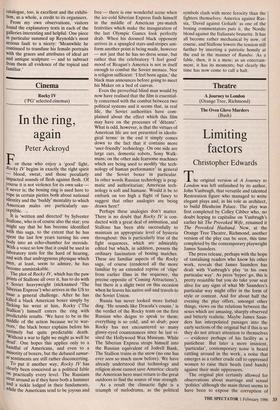Cinema
Rocky IV (`PG' selected cinemas)
In the ring, again
Peter Ackroyd
For those who enjoy a `good' fight, Rocky IV begins in exactly the right spirit blood, sweat, and those peculiarly Impacted sounds of flesh against flesh. Of course it is not violence for its own sake it never is; the boxing ring is used here to rope in certain pieties both about national identity and the 'buddy' mentality to which American males are particularly sus- ceptible. .
It is 'written and directed' by Sylvester Stallone, who is of course also the star; you might say that he has become identified with this saga, to the extent that he has spent the last few years turning his own body into an echo-chamber for steroids. With a voice so low that it could be used in laboratory tests for the hard of hearing, and with that androgynous physique which men, at least, seem to admire, he has become unmistakable.
The plot of Rocky IV, which has the paw Prints of Stallone all over it, has to do with a Soviet heavyweight (nicknamed 'The Siberian Express') who arrives in the US to issue a general challenge. After he has killed a black American boxer simply by flicking his wrist at him, Rocky (`The Stallion') himself enters the ring with Predictable results. 'We have to be in the Middle of the action because we're war- riors,' the black boxer explains before his untimely but quite predictable death. `Without a war to fight we might as well be dead'. One hopes this applies only to a handful of Americans, and even to a Minority of boxers, but the debased samur- ai sentiments are still rather disconcerting.
To put it another way, Rocky IV has clearly been conceived as a political fable cm practically every level. The Russians strut around as if they have both a hammer and a sickle lodged in their fundaments, While the Americans tend to be joyous and free — there is one wonderful scene when the ice-cold Siberian Express finds himself in the middle of American pre-match festivities which make the inauguration of the last Olympic Games look perfectly drab. When his doomed black opponent arrives in a spangled stars-and-stripes uni- form another point is being made, however — not just that he has no dress sense, but rather that the celebratory 'I feel good' mood of Reagan's America is not in itself enough to combat the Soviet menace. Nor is religion sufficient: 'I feel born again,' the black man announces before going to meet his Maker on a bed of canvas.
Even the proverbial blind man would by now have realised that the film is essential- ly concerned with the combat between two political systems and it seems that, in real life, the Soviet authorities have com- plained about the effect which this film may have on the processes of 'détente'. What is odd, however, is that the virtues of American life are not presented in ideolo- gical terms: in the end it simply comes down to the fact that it contains more `user-friendly' technology. On one side are large cars, domestic robots, Sony Walk- mans; on the other side fearsome machines which are being used to modify 'the tech- nology of human performance' in general and the Soviet boxer in particular.
In other words Russian technology is prag- matic and authoritarian; American tech- nology is soft and humane. Would it be to embark on too high a flight of fancy to suggest that other analogies are being drawn here?
Perhaps these analogies don't matter. There is no doubt that Rocky IV is con- ducted with a great deal of animation, and Stallone has been able successfully to maintain an appropriate level of hysteria throughout: this is particularly true of the fight sequences, which are admirably edited but which, in addition, possess the ordinary fascination of boxing matches.
These are familiar aspects of the Rocky saga, of course (rendered all the more familiar by an extended reprise of 'clips' from earlier films in the sequence, the precise opposite of 'Coming Attractions'), but there is a slight twist on this occasion when he leaves his native soil and travels to the Soviet Union.
Russia has never looked more forbid- ding. 'He sounds like Dracula's cousin,' is the verdict of the Rocky team on the first Russian who deigns to speak to them; everything is so cold, and so drab; poor Rocky has not encountered so many glassy-eyed countenances since he last vi- sited the Hollywood Wax Museum. While The Siberian Express straps himself into the Russian equivalent of Jodrell Bank, The Stallion trains in the snow (no one has ever seen so much snow before). We have already understood that technology and religion alone cannot save America: clearly the American hero must return to the great outdoors to find the source of true strength. As a result the climactic fight is a triumph of melodrama, as the political symbols clash with more ferocity than the fighters themselves: America against Rus- sia, 'David against Goliath' as one of the boxing commentators puts it, the Nordic blond against the Italianate brunette. It has all become rather mechanical by now, of course, and Stallone lowers the tension still further by inserting a patriotic homily at the end in the manner of Rambo. As a fable, then, it is a mess; as an entertain- ment, it has its moments; but clearly the time has now come to call a halt.














































 Previous page
Previous page